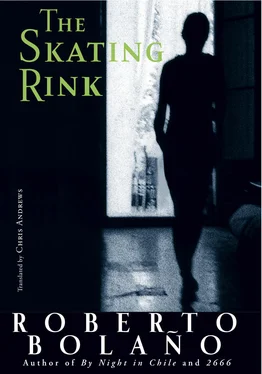Enric Rosquelles:
The books they gave me
The books they gave me. Saint Lydwina or the Subtlety of Ice is an exquisitely illustrated little book about the patron saint of skaters. The story unfolds in the year 1369 and focuses, in a slightly obsessive fashion, on an afternoon that is, so we gather, momentous for the one and only character. Saint Lydwina of Schiedam, who has been immersed in an ocean of doubts for hours, is skating on the frozen surface of a river as the first signs of night begin to appear on the horizon. The frozen river is sometimes described as a “corridor” and sometimes as a “sword” between day and night. The saint, who is young and beautiful, but frowning, skates on in spite of the gathering dusk. In the book we are told that she is going back and forth between two bridges, about five hundred yards apart. Suddenly, the expression on her face changes; her eyes light up and she thinks she understands the ultimate meaning of what she is doing. Just at that point she falls and (“deservedly”) breaks a rib. The book ends there, informing us that Saint Lydwina recovered from this accident and returned to skating with, if anything, even greater delight. Remo Morán’s novel is entitled Saint Bernard , and recounts the deeds of a dog of that breed, or a man named Bernard, later canonized, or a delinquent who goes by that alias. The dog, or the saint, or delinquent, lives in the foothills of a great icy mountain and every Sunday (although in some places it says “every day”) he goes around the mountain villages challenging other dogs or men to duels. Gradually, his opponents begin to lose heart, and in the end no one dares to address him. They all apply “the law of ice,” to cite the text. Yet Bernard persists and, every Sunday, continues to do the rounds of the villages, challenging the few ill-informed souls who are slow to flee before him. Time passes and Bernard’s canine or human opponents grow old and retire from public life, some kill themselves, others die of natural causes, most end up in sad old age homes. As for Bernard, he too grows old, and since he doesn’t live in a village, solitude and old age make him tetchy and irascible. The duels continue, of course, and his opponents keep getting younger, although at first he doesn’t notice, but then it hits him with the force of a hammer blow. Morán isn’t sparing with blood, which pours forth in torrents, or sperm, which spurts abundantly, or tears which rain down on the flimsiest pretexts. Half-way through the novel, Bernard leaves the foothills of the great mountain (“wagging his tail”) and spends a season in a valley, and another season following the course of a river. When he returns home, everything continues as before. The duels become more and more violent; his body is gradually covered with scars and roughly stitched wounds. On one occasion he is on the brink of death. On another he is ambushed as he leaves a village. Finally duels are prohibited by decree throughout the land, and Bernard, having repeatedly broken the law, must flee. Then, at the end of the novel, something strange occurs: after shaking off his pursuers, while sheltering in a cave, Bernard undergoes a metamorphosis: his old body splits into two parts, each identical to the original whole. One part rushes down into the valley, shouting with joy. The other climbs laboriously toward the summit of the great mountain, and is never heard of again. .
Remo Morán:
It kills me to see people leaving like this
It kills me to see people leaving like this, said the Rookie, while I hang on here hoping for a miracle. The elemental miracle or the miracle of understanding. In the afternoon, I’d go down to the beach to see him, and he was almost always in the same place: a stand where a huge guy with a scarred face rented out pedal-boats. The Rookie looked like a dwarf beside him, and felt safe: they didn’t talk, they just stayed together until it got dark; then they went off in opposite directions. That was the only pedal-boat stand left on the beach, and there were hardly any takers. To help out, the Rookie sometimes went along the beach offering people pedal-boats, but no one paid any attention. Around that time, Nuria left Z without saying a word to me. According to Laia, she went to live with a friend in Barcelona, where she had found work. Lola and our son moved to Gerona. Alex had started getting ready to close down the jewelry stores, the campground and the hotel (the Cartago would stay open through the winter, as usual) and only emerged from his office for meals. There were very few people left in the campground, except for a group of retired vacationers run wild, who threw a party every night as if they could sense death approaching. The scandal over the Palacio Benvingut had abated, although Rosquelles’ embezzlement was still a topic of conversation in Z; the Socialist and Covergencia parties were using it as a political weapon in their battle for the council. Other scandals had come to light throughout Spain, and the world went imperturbably spinning on its way through the void. As for me, I was starting to get tired of Z, and sometimes thought about leaving, but where would I go? I thought about selling up and living on a farm near Gerona, but that was not a good idea. Nor was moving to Barcelona, or returning to Chile. Maybe Mexico, but no, deep down I knew I didn’t have the courage to go back there. All we need now is for it to start snowing, said the Rookie one afternoon, as we were walking along the Paseo Marítimo, by the beach, where a few solitary bathers had dug themselves into the sand, or were jogging along in a desperate attempt to lose weight or get into shape. Snowing? Yes, boss, said the Rookie, with a feverish glint in his eye (he was drunk or high), yes, so the snow can cover me up and kill me. .
Gaspar Heredia:
We had a week left to go
We had a week left to go. Bobadilla had started gradually laying off the staff, and one day I woke up and found out that Rosa and Azucena had gone back to El Prat. Before they left, they’d bought a cake and had a little send-off. I was sad to hear they’d gone and sorry to have slept through the party. Caridad saved me a piece of cake, which I ate at the back of the campground, staring at the fences and the shadows moving on the walls of the neighboring buildings, which were almost all empty. The thought of leaving Z filled me with apprehension, but we had to go. In the meantime Caridad suggested we visit the Palacio Benvingut one last time. I flatly refused. Why go back there? It wasn’t like we’d left anything behind. It was better to stay within the confines of the campground until the day of our definitive departure. Caridad seemed to be convinced, but she wasn’t. For a moment, her eyes were covered by the blurry film that was the sign and agent of a force sucking her away toward another reality. It’s because she’s exhausted, I told myself, that’s all, and her bad diet. Or: when eyes are very dark, black in fact, they’re bound look blurry in certain kinds of light. But to be honest I couldn’t reassure myself. With each passing day my fear intensified. Fear of what? I can’t say for sure, although I guess it was fear of coming to the end of happiness. It’s symptomatic of my state of mind that when I was alone, I passed the time making calculations on paper or with a stick on the ground: how much Remo Morán owed me, plus the bonus, and the number of months it would last, roughly until Christmas, a great time to run out of money. I hoped to have another job by then, even if it was playing Santa Claus or one of the Magi. Sometimes I found myself thinking about the police. I dreamed of dim, windswept police stations, and gutted filing cabinets, their contents strewn on the floor, yellow record cards for foreigners whose residency permits had expired years ago, documents that would never be read again, gradually obliterated by time: cases filed and lost. The faces of killers filed and lost. Now the war is over and all legal immigrants are allowed to work. I tried to be positive when I woke up — telling myself the worst was behind us, everything had worked out fine — but I couldn’t escape that precarious feeling. Once I was woken by Caridad’s voice softly saying that she wanted to go to the Palacio Benvingut to avenge Carmen. I opened my eyes, thinking that she was talking to someone outside the tent, but no, she was lying right beside me, whispering the words into my ear. Why spoil everything with that damn palace? I mumbled, still half asleep. Caridad laughed as if she had been caught playing a mischievous game. Not a glimmer of daylight was showing through the canvas, so I assumed that night had fallen; the silence of the evening in the empty campground was physically chilling, and I had the impression, I don’t know why, that there was a dense fog outside. Avenge Carmen? I asked: How? Caridad didn’t answer. Do you think the killer will return to the scene of the crime? I felt Caridad’s lips moving down from my ear to my neck, where they stopped: I felt her lips, then her teeth, then her tongue. I rolled over, feeling sick, and tried to make out her face. Caridad’s eyes were invisible in the darkness. Poor Carmen, she said, I know who killed her. I’ve talked about it with your friend Remo. When? I asked. He came to see me a couple days ago and we had a good talk about it. So Remo knows who killed Carmen? Me too, said Caridad. Why do you want to go to the Palacio Benvingut, then? You should go to the police, I said. After that, there was no way I could get back to sleep. .
Читать дальше












